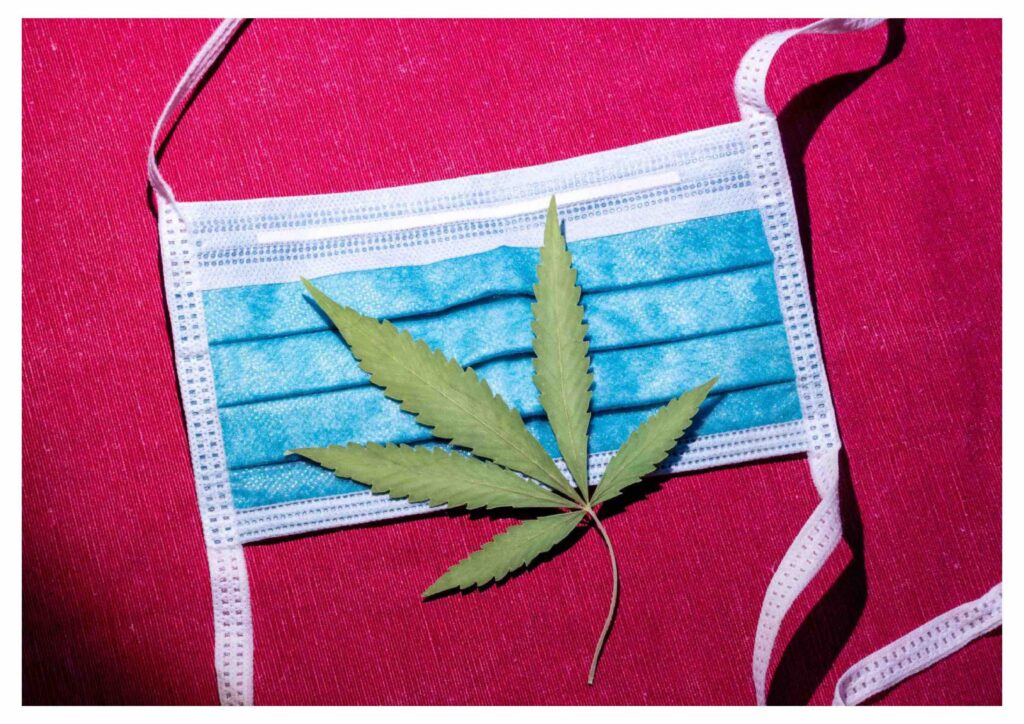
A recent study points to the role of cannabis in fighting COVID-19
Can Weed Really Help Your Body Beat the Coronavirus? Or are the researchers just blowing smoke? Here’s what we know.
Before the outbreak of COVID in early 2020, evidence of cannabis’ effectiveness as a medicinal plant was largely anecdotal. Vietnam Veterans Snuck It Home To Curb PTSD; Bay Area activists gave it to people battling AIDS and cancer in the ’80s and ’90s. And patients with various ailments today rely on medical marijuana to treat pain, nausea, and many other problems.
But a new study published in the Journal of Cannabis Research shows that active cannabis users actually fared better than non-users after contracting COVID-19, including lower ICU admission rates and the need for ventilator intervention. In contrast to a recent CBD study, which some on social media mistook as a miracle cure for COVID, this study actually finds some evidence that regular cannabis smokers suffered from less severe symptoms of the virus.
Related
No, CBD will not cure Covid. Here’s what this study actually found
Authored by researchers from the David Geffen School of Medicine at the University of California, Los Angeles, the study, which is not yet peer-reviewed, analyzed 1,831 adult patients admitted to two UCLA hospitals between February 2020 and February 2021.
Most significantly, the study found that “ICU admissions were 12 percentage points lower (p=0.018) and intubation rates 6 percentage points lower (p=0.017) in cannabis users,” even after accounting for age, gender, and BMI Tobacco Smoking History.
Researchers used a variety of analytical markers, including the NIH COVID-19 Severity Score, supplemental oxygen requirements, ICU admissions, mechanical ventilation, length of hospital stay, and in-hospital death for cannabis users and non-users. , in addition to comorbidities such as tobacco smoking status, diabetes, heart and lung disease.
Related
The best cannabis research studies of 2021
Overall, active cannabis users (defined as cannabis use by smoking, vaping, or ingestion within one month of approval) made up only 4% (69 people) of the sample size. Cannabis users also had better overall health outcomes than non-users, even when adjusted for their younger age, tobacco use, and the fact that they received fewer COVID-related therapies such as steroids and antibiotics.

But don’t start with the “I told you so” just yet. The authors acknowledge that their results have limitations.
First, they could only use retrospective data reporting cannabis use itself, which left room for inaccuracy and a lack of data on alcohol and other substance use.
Related
Foliar Examination: Fentanyl-spiked marijuana is a myth. It’s time to end the hype
The study also points to other research suggesting that heavy use and cannabis use disorders are associated with poorer health outcomes and a higher risk of breakthrough COVID cases.
For now, most experts agree that smoking cannabis can still cause lung damage, even when users report lower inflammatory markers. But as we’ve previously reported, opinions on cannabis and its effects on the immune system remain mixed.
Federal prohibition still largely inhibits cannabis-centric research, and even those that are peer-reviewed and published face restrictions on access, funding, and data.
While the results look good here, don’t assume that hitting the bong will replace a vaccine or save you from being exposed to a new variant. Only time and new research will tell what exactly cannabis can do for us and our health.
Amelie Williams
New York-based freelance cannabis journalist Amelia Williams is a graduate of San Francisco State University’s journalism program and a former budtender. Williams has contributed to GreenState, MG Magazine, Culture Magazine and Cannabis Now, Kirkus Reviews and The Bold Italic of the San Francisco Chronicle.
Check out Amelia Williams’ articles
By submitting this form, you are subscribing to Leafly news and promotional emails and agreeing to Leafly’s Terms of Service and Privacy Policy. You can unsubscribe from Leafly email communications at any time.

Post a comment: